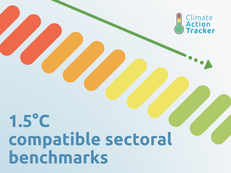Publications (Germany)
Pulling the plug on fossils in power
Decarbonising the power sector is a key step on the road to net zero as it will cut both power sector emissions and help push fossil fuels out of the buildings, transport and industrial sectors as these sectors electrify.To help track global and country level progress, the Climate Action Tracker read more...
Paris-aligned benchmarks for the power sector
As the world moves to address the climate crisis and journey towards a zero-carbon future, roadmaps which demonstrate the pathway to cut emissions fast, fairly and effectively are essential.The broad strokes of a Paris-aligned roadmap are clear – we need to roughly halve emissions by 2030, achieve net zero CO2 read more...
Germany’s proposed 2030 national target not yet 1.5˚C-compatible
Diese Analyse ist auch auf Deutsch verfügbar. To be in line with the 1.5°C limit of the Paris Agreement, Germany’s new 2030 domestic reduction target should aim for national emission reductions of at least 69% below 1990 levels. To fully contribute its fair share Germany would have to significantly increase read more...
Deutschlands vorgeschlagenes Klimaziel für 2030 noch nicht 1,5˚C-kompatibel
This analysis is also available in English. Um mit der 1,5°C-Grenze des Pariser Klimaschutzabkommens im Einklang zu sein, müsste sich Deutschland ein neues Klimaziel für 2030 von mindestens 69% nationaler Emissionsminderung unter dem Niveau von 1990 setzen. Außerdem müsste Deutschland seinen Beitrag zur internationalen Klimafinanzierung deutlich erhöhen, um seinen fairen read more...
A government roadmap for addressing the climate and post COVID-19 economic crises
The COVID-19 pandemic presents the world with an unprecedented policy challenge: not only will it have a severe impact on the global economy likely to exceed that of both the 2008-09 Global Financial Crisis and the Great Depression, it will take place against the backdrop of the ongoing climate crisis.In read more...
Governments still showing little sign of acting on climate crisis
Under current pledges, the world will warm by 2.8°C by the end of the century, close to twice the limit they agreed in Paris. Governments are even further from the Paris temperature limit in terms of their real-world action, which would see the temperature rise by 3°C. An ‘optimistic’ take read more...
Climate crisis demands more government action as emissions rise
The last year has seen growing public concern and the formation of global movements pushing governments for serious action in the face of rising emissions and escalating climate impacts.2018 saw energy-related emissions reach yet another historic high after significant net greenhouse gas increases, 85% of which came from the US, read more...
Analysis: Transformation points - Achieving the speed and scale required for full decarbonisation
Staying within the Paris Agreement 1.5˚C temperature limit requires rapid, large-scale systemic transformations to fully decarbonise the global energy system by 2050.Transformations of the speed and scale required have occurred historically when systems reached a transformation point: the moment when a previously novel technology, behaviour or market model achieved critical read more...
G20 - all INDCs in, but large Gap remains
The 2015 G20 Summit, (Turkey, 15-16 November) will see Heads of State and Government meet to discuss, among other issues, development, energy and climate change finance.All G20 members have presented their “intended nationally determined contributions” or INDCs, to the UNFCCC for the Paris Agreement. The Climate Action Tracker (CAT) has read more...
G7+EU INDCs: some improvement, but a large emissions gap remains
The combined climate plans for the G7 and EU have made a small step towards the right track to hold warming to 2?C, but there is still a substantial emissions gap, the Climate Action Tracker said today.Ahead of the upcoming G7 meeting in Germany, the Climate Action Tracker - an read more...
Stay informed
Subscribe to our newsletter







